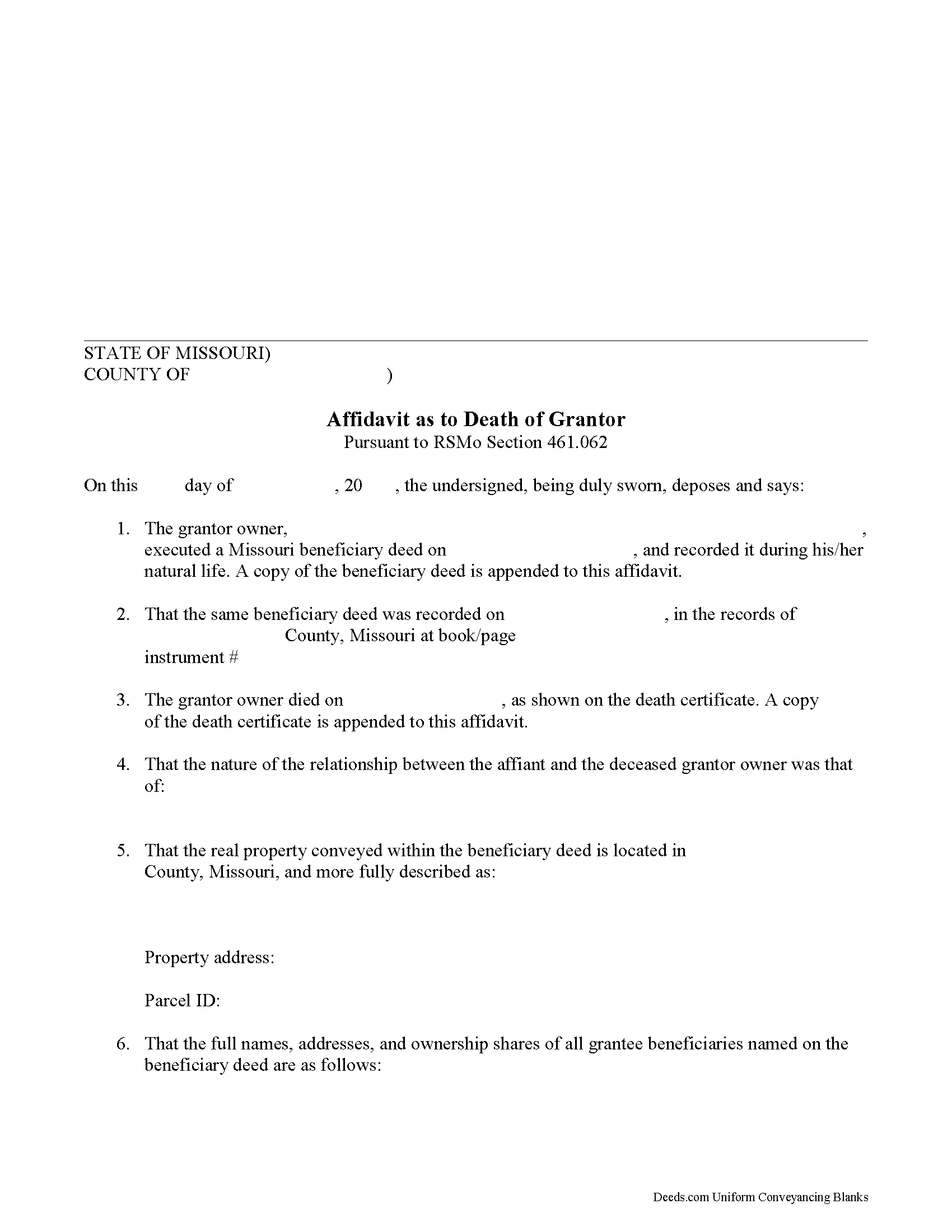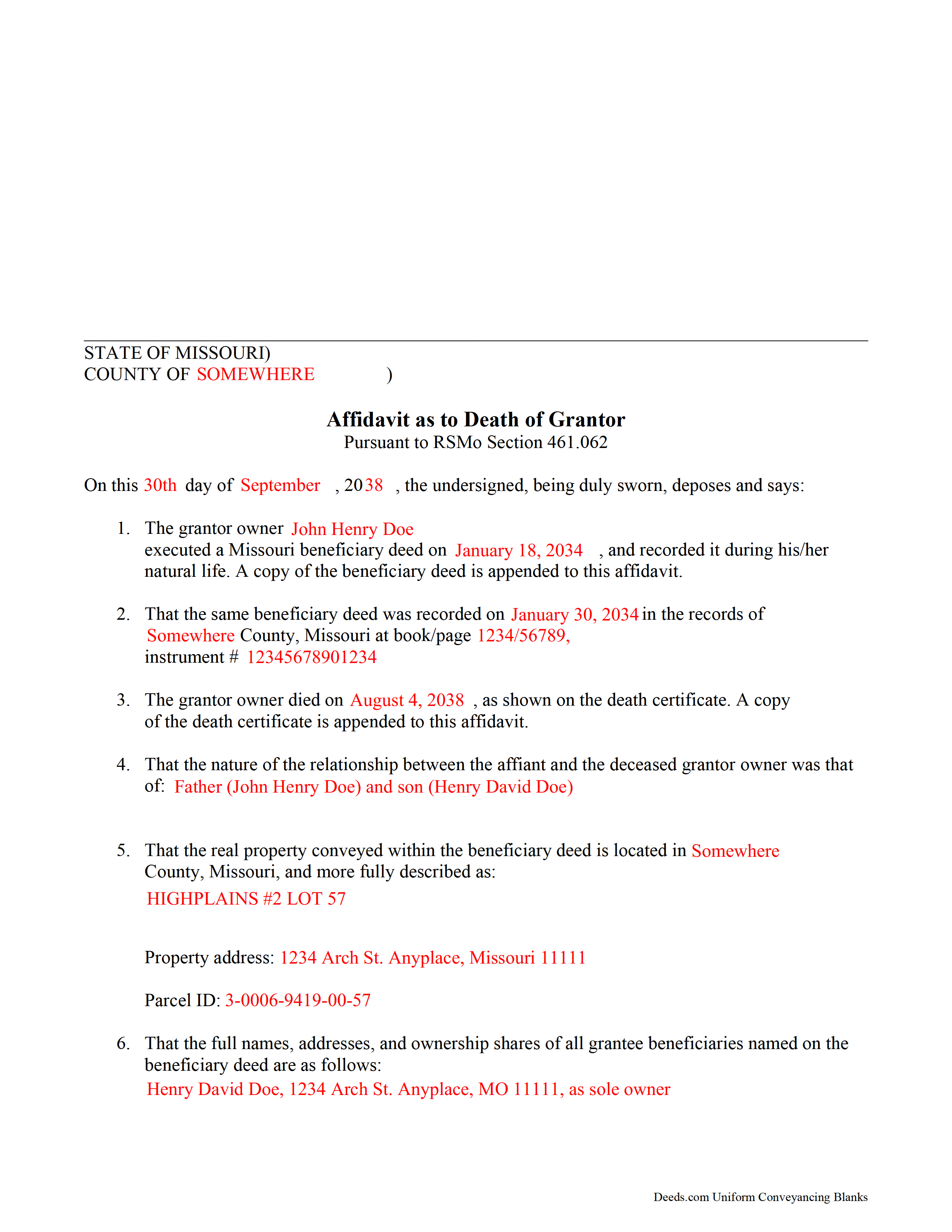


Example of a properly completed form for reference.
Included Saint Louis County compliant document last validated/updated 9/6/2024
County Government Bldg - 41 South Central Ave, Clayton, Missouri 63105-1799
Hours: 8:00am-5:00pm M-F
Phone: (314) 615-7100
Forms are available immediately after submitting payment.
Immediately after you submit payment, the Saint Louis County forms you order will be available for download directly from your account. You can then download the forms to your computer. If you do not already have an account, one will be created for you as part of the order process, and your login details will be provided to you. If you encounter any issues accessing your forms, please reach out to our support team for assistance. Forms are NOT emailed to you.
This indicates the most recent date when at least one of the following occurred:
Yes. Our form blanks are guaranteed to meet or exceed all formatting requirements set forth by Saint Louis County including margin requirements, content requirements, font and font size requirements.
Yes. You can re-use the forms for your personal use. For example, if you have more than one property in Saint Louis County that you need to transfer you would only need to order our forms once for all of your properties in Saint Louis County.
Often when a deed is recorded, additional documents are required by Missouri or Saint Louis County. These could be tax related, informational, or even as simple as a coversheet. Supplemental forms are provided for free with your order where available.
All of our Saint Louis County Affidavit as to Death of Grantor forms are PDFs. You will need to have or get Adobe Reader to use our forms. Adobe Reader is free software that most computers already have installed.
You will need to have Adobe Reader installed on your computer to use our forms. Adobe Reader is free software that most computers already have installed.
No. The blank forms are downloaded to your computer and you fill them out there, at your convenience.
Yes, you can save your deed form at any point with your information in it. The forms can also be emailed, blank or complete, as attachments.
No. Nothing to cancel, no memberships, no recurring fees.
The Nonprobate Transfers Law of Missouri, Sections 461.003 to 461.081 RSMo (2012) has been in effect since 1989. While the law is specific on requirements for the beneficiary deed, it is less clear on the process for accepting the real property rights conveyed. Section 461.062, however, offers some guidance.
Under the Nonprobate Transfers Law of Missouri, grantee beneficiaries who survive the deceased owner by at least 120 hours gain ownership of property designated as "transfer on death" by function of law, upon the death of the owner (461.042). There are two primary reasons to formalize this transfer of ownership, even though it is supposed to happen automatically.
First, it is always a good idea to record changes to the named owner of real estate, providing notice to the public that the former beneficiary now holds title to the land and keeping the ownership history up to date. This ownership history is called the chain of title. A clear chain of title (with no gaps or interruptions) makes property easier to sell by reducing the chances of unexpected claims from others trying to assert their ownership rights.
Then, by recording an affidavit asserting the new claim on the title, the beneficiary lets the local assessor or taxing agency know that, as the record owner of the unique parcel of land, he/she is now responsible for the property taxes. Land owners must remain current on property taxes or risk penalties such as fines, liens, and possibly losing the real estate in a tax sale, so it is essential that the tax statements arrive at the correct location.
The question arises, then, of exactly how to let the relevant transferring entities know about the owner's death. There is no statutory form or action required to effect the change, but 461.062 provides some guidance for written requests to formalize these transfers. For the most part, it involves recording an affidavit that includes the grantor owner and grantee beneficiary's information, recording details about the beneficiary deed, and specifics regarding shared ownership of the property. To support the affidavit, the claiming beneficiary must also include a copy of the recorded beneficiary deed and a death certificate for the owner as well as any deceased beneficiaries.
When presenting the affidavit and supporting documents for recording, be sure that they will update the tax records as well. If not, send a copy of the death certificate and the recorded beneficiary deed to the county assessor, too.
In short, by setting aside some time in the days following the death of the owner (preferably within the first six months) to complete and record a Missouri affidavit as to the death of grantor, the beneficiary protects his/her interest in the newly-acquired real estate, while limiting the likelihood of future problems with taxes or title.
IMPORTANT TERMS as defined in 461.005
A grantee beneficiary, also called simply a beneficiary is a person or persons designated or entitled to receive property pursuant to a nonprobate transfer on surviving one or more persons.
The death of the owner in the case of joint owners, means death of the last surviving owner.
The owner is a person or persons having a right, exercisable alone or with others, regardless of the terminology used to refer to the owner in any written beneficiary designation, to designate the beneficiary of a nonprobate transfer, and includes joint owners. The provisions of this subdivision shall apply to all beneficiary deeds executed and filed at any time, including, but not limited to, those executed and filed on or before August 28, 2005.
A transferring entity is a person who owes a debt or is obligated to pay money or benefits, render contract performance, deliver or convey property, or change the record of ownership of property on the books, records and accounts of an enterprise or on a certificate or document of title that evidences property rights, and includes any governmental agency, business entity or transfer agent that issues certificates of ownership or title to property and a person acting as a custodial agent for an owner's property.
(Missouri AOD Package includes form, guidelines, and completed example)